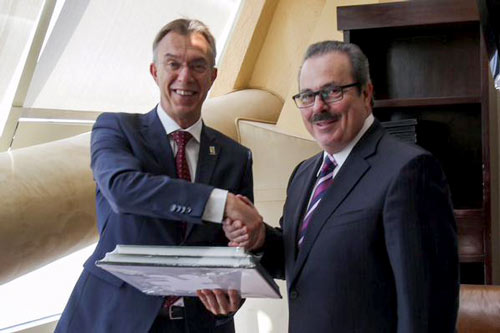 Texcoco, Mexico, 11 June 2015.- Mexico’s Secretary of Agriculture, Livestock, Rural Development, Fisheries and Food (SAGARPA) and the International Maize and Wheat Improvement Center (CIMMYT) discussed today their continued commitment to Mexico’s food security and pledged to work together to raise Mexico’s self-sufficiency of cereal production to 75 percent by 2018. Enrique Martínez y Martínez, head of SAGARPA, and Martin Kropff, newly appointed director general at CIMMYT, held a meeting to discuss research and development priorities in the framework of their strategic collaboration. As an example of the collaboration the MasAgro project aims to boost maize productivity by promoting use of improved seeds and sustainable farming practices among Mexico’s smallholder farmers and how these past efforts can be improved for more impact that responds to real needs.
Texcoco, Mexico, 11 June 2015.- Mexico’s Secretary of Agriculture, Livestock, Rural Development, Fisheries and Food (SAGARPA) and the International Maize and Wheat Improvement Center (CIMMYT) discussed today their continued commitment to Mexico’s food security and pledged to work together to raise Mexico’s self-sufficiency of cereal production to 75 percent by 2018. Enrique Martínez y Martínez, head of SAGARPA, and Martin Kropff, newly appointed director general at CIMMYT, held a meeting to discuss research and development priorities in the framework of their strategic collaboration. As an example of the collaboration the MasAgro project aims to boost maize productivity by promoting use of improved seeds and sustainable farming practices among Mexico’s smallholder farmers and how these past efforts can be improved for more impact that responds to real needs.
Secretary Martínez y Martínez acknowledged CIMMYT’s efforts in increasing maize and wheat productivity in Mexico and in the world but requested the non-profit international research organization to come up with new ideas to tackle food security challenges in Mexico within the new global context. President Peña Nieto pledged to increase spending in research to 1 percent of Mexico’s GDP. Current investment stands at 0.35 percent and SAGARPA counts on CIMMYT to help increase investment in agricultural research for development, Martínez said.
During the meeting, Martin Kropff restated CIMMYT’s commitment to Mexico’s development. “We strongly believe in public – private partnerships and want to help Mexico further strengthen its links with international research networks,” said Kropff who was Rector of Wageningen University, a world class agricultural higher education institution in the Netherlands, before recently joining CIMMYT. Research, however, should not be done for the sake of research but garantee impact and respond to demand-driven needs, agreed both leaders.
SAGARPA and CIMMYT agreed to work together to develop a yellow maize integrated seed sector in Mexico. The country is self-sufficient in white maize production but imports between 8 to 10 million tons of yellow maize to meet industry and livestock demand for yellow grain. Also a plan for a public-private investment platform in the wheat sector could jointly be developed through a bilateral working agenda.
 Innovations
Innovations